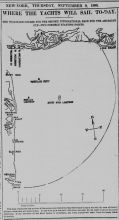 It was not a hard struggle between two fleet boats, it was a walk-over, and the Galatea never near enough to her rival to make the affair interesting. From the race yesterday it looks as if any one of the-four big sloops would be more than a match for the Galatea. The English boat crossed the line nearly half an hour after the Mayflower had finished. The Galatea finished "by moonlight alone," and her dispirited crew could see the Mayflower far off in the distance sailing in by the Point of the Hook accompanied by most of the tugs and excursion steamers which had come out to see the race. It was not a hard struggle between two fleet boats, it was a walk-over, and the Galatea never near enough to her rival to make the affair interesting. From the race yesterday it looks as if any one of the-four big sloops would be more than a match for the Galatea. The English boat crossed the line nearly half an hour after the Mayflower had finished. The Galatea finished "by moonlight alone," and her dispirited crew could see the Mayflower far off in the distance sailing in by the Point of the Hook accompanied by most of the tugs and excursion steamers which had come out to see the race.
The Mayflower was well sailed, as usual, by General Paine. The Galatea was badly handled by J. Beavor-Webb. Had the cutter been properly handled she might have cut down the time by which she was beaten, but she stood no more chance of winning against the peerless and wonderful Mayflower, even if a sailor had been at the tiller, than she did of flying after one of the carrier-pigeons which brought the news of her overwhelming defeat up to the city. Never has a yacht with any pretentions to speed been so humiliatingly defeated. In comparison with the Mayflower, she seemed to be anchored. It was cruel for such a yacht, with J. Beavor-Webb at the helm, to sail against a yacht like the Mayflower, handled in the skilful way she was.
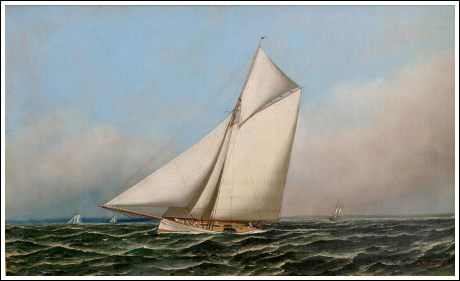
The race was over the outside course, twenty miles to Ieeward and return from the Scotland Lightship. The wind was blowing freshly, about fifteen miles an hour at the start, but after the turning buoy was rounded it began to die out, and after some time it seemed as if even the Mayflower could not reach the lightship in time to make a race. But she got some wind under the land and, as it needs only the slightest provocation to make the Mayflower go like a racehorse she came flying over the line with about ten minutes to spare. Then was nothing wonderful in her beating the Galatea, but her race against time when she got the breeze and came rushing up to the lightship was marvelous.
At 8:30 A.M. the judges' boat, Luckenbach, took the Galatea in tow off Bay Ridge and the tug Scandinavian got a line to the Mayflower. They were towed out to the Scotland Lightship and there cast off.
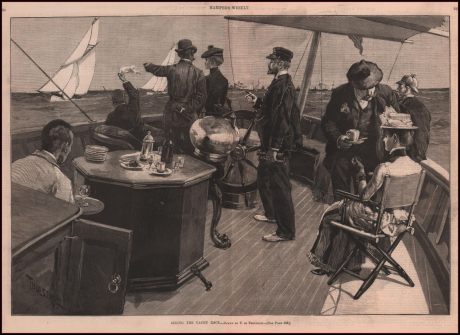
The wind blew freshly from the northwest and the course given out was twenty miles southeast. After some maneuvering measures Hyslop was safely landed on the Scandinavian from the iron steamer Taurus as an annex to the regatta committee and started with a taffrail log to log off the course. Before the Scandinavian started the Galatea came alongside the judges' boat and Lloyd Phenix sang out from her deck that Lieutenant Henn was sick, and requested that the course be fifteen miles and return instead of twenty. The regatta committee decided that they did not have autuority to shorten the course. Then Mr. Phenix requested that a tug be send to the Galatea immediately after the race to tow her up to the city, as Lieutenant Henn wanted to see a physician that night. This was promised by the committee and the steel cutter went gilding away. Just then the Priscilla was seen running down near the lightship. She was in racing trim and had evidently come out to show what she could do with the champions. She found out what she could do with the Mayflower before the race was over.
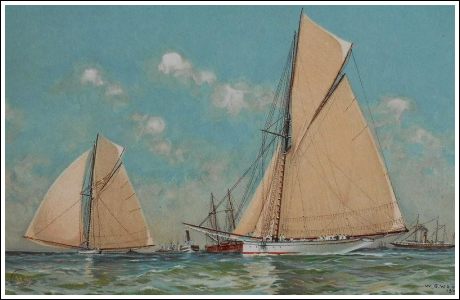
At 11:10 the Luckenbach blew the preparatory whistle, and ten minutes later the starting signal was given. Both yachts were near the line. The Mayflower had her spinnaker run up in stops and broke it out. It was beautifully done, and a sheer went up from the people in the excursion boats. Under mainsail, club topsail, spinnaker, fore staysail and jib the yacht, whose beauty even the disfiguring pot lead could not conceal, went rapidly across the line before the strong wind which was now breaking the surface of the ocean into white caps. The Galatea went over about two minutes later and set her spinnaker as she crossed. The Mayflower set her balloon jib-topsail soon after crossing and took in her other headsails. Thus doing all her work with her immense spinnaker and jib topsail, her great mainsail and towering club topsail, she was blown rapidly toward the southeast. The Galatea did not set her balloon jib topsail, but kept up her forestaysail and jib for headsails.
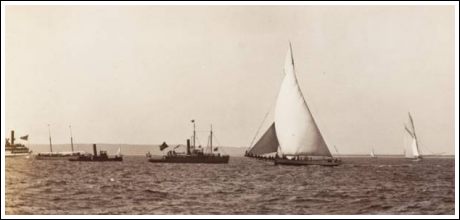
The time of the start was as follows:
Mayflower: 11:22:40
Galatea: 11:24:10
|
|
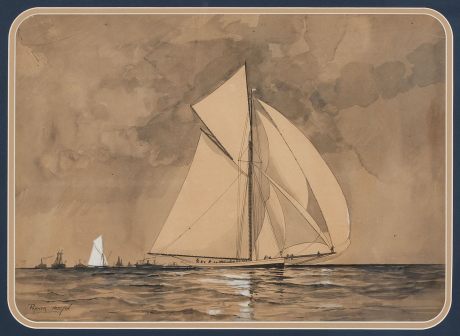
The Mayflower at once began to run away from her competitor. The Red Cross in the white field flattered from the peak of the Galatea's mainsail in the strung wind. Her lean body was scarcely perceptible beneath her towering piles of canvas, and her sharp bows cut through the waves like a knife. But the Yankee ghost ahead of her, with the water foaming beneath her bows, drew farther and further away. A stern chase is proverbially a long chase, but when a boat has the Mayflower in front of her, its length has no end except the regatta committee's seven-hour limit; so the two racers went sweeping toward the southeast and the Priscilla, which had passed inside the lightship about the same time as when they crossed the line, went sweeping down also, her racing sails distended by the wind and her iron hull making good time over the water. She was in shore from the racer, but rapidly drew up on the Galatea, and before the outer mark was reached she was ahead of the cutter. The course being forty miles in all the Mayflower allowed the Galatea thirty-nine seconds. The Mayflower and Priscilla came up to the turning buoy not far apart. The Galatea was some distance behind. The times of rounding were as follows:
Mayflower.1:55:05
Galatea 2:10:20
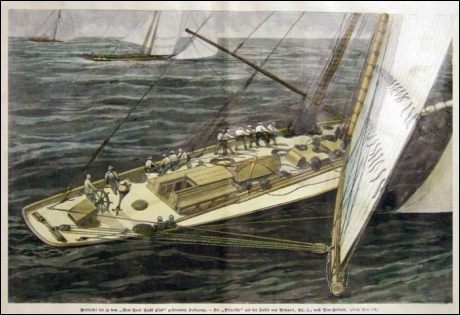
The Priscilla rounded the buoy at 1:57:00. The Mayflower had gained thirteen minutes and forty-five seconds on the Galatea on the run out. The elapsed time to the outer mark was as follows:
Mayflower.2:32:25
Galatea.2:46:10
The Priscilla after rounding the buoy began to beat up to windward, but when the wind died out and she saw the Mayflower a hopeless way ahead of her she took a diminutive but friendly tug and was towed home. The yachts took in their spinnakers before rounding and the balloon jib topsail of the Mayflower likewise disappeared. The yachts had up fore staysails and jibs when they began the windward tack, and after a while the Galatea set a small jib topsail. 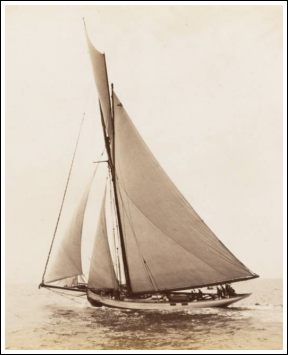 The racers stood on the starboard tack, reaching far over toward the Jersey shore. The Mayflower made one short leg on the port tack, but quickly came back on the starboard tack again. The wind began to die out soon after the buoy had been turned and every minute it got lighter and lighter. Finally it was almost a flat calm, and the long swells shook the sails of the yachts. The racers stood on the starboard tack, reaching far over toward the Jersey shore. The Mayflower made one short leg on the port tack, but quickly came back on the starboard tack again. The wind began to die out soon after the buoy had been turned and every minute it got lighter and lighter. Finally it was almost a flat calm, and the long swells shook the sails of the yachts.
Over toward the Jersey beach was a long, narrow, rippling streak of water. There was wind there, and if a yacht was fleet enough to get to it before the wind on the rest of the ocean entirely died out she could get the advantage of it. The Mayflower and Galatea both headed for it. The Yankee boat got there. The cutter did not. As soon as the sloop felt the breeze she began to go at something like her ordinary everyday pace. But valuable time had been slipping away, while the yachts went in search of a wind to carry them over the line and the lightship was miles away. The Mayflower came on the port tack and laid her course for the lightship. Far aft to the south a streak up and down the sky told when the Galatea was beginning to get a breeze and was making her way to the finish.
It did not seem possible for the Mayflower to get to the lightship in time to make a race. But even in the light wind it was seen that she was coming up with wonderful swiftness. The sun was just on the horizon. The lights shone on the lightship and the shades of the evening gathered over the ocean. Then clear and beautiful against the setting sun, her lofty canvas towering into the glowing sky, the swiftest and most beautiful boat the world has ever seen dashed over the line.
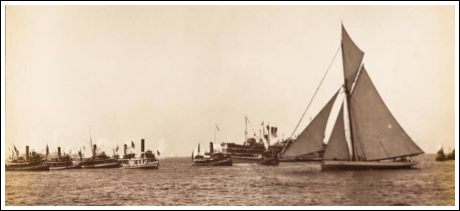
The Galatea could be seen coming up in the gathering gloom, but she was far away. The Regatta Committee waited a while at the lightship and then decided to run to the Galatea and offer her a tow, not stopping to take her time. They started to do so, but a suspicion that it would hardly be courteous, or else some emphatic remarks which were made about an international yacht race at which the visiting boat was not timed, made them turn back and wait to take the cutter’s time. The time of the race was as follows:
| |
Start. |
Finish. |
Actual
Times. |
Corrected
Times. |
| |
H. |
M. |
S. |
H. |
M. |
S. |
H. |
M. |
S. |
H. |
M. |
S. |
| Mayflower |
11 |
22 |
40 |
6 |
11 |
40 |
6 |
49 |
00 |
6 |
49 |
00 |
| Galatea |
11 |
24 |
10 |
6 |
42 |
58 |
7 |
18 |
48 |
7 |
18 |
09 |
Thus the Mayflower beat the Galatea twenty nine minutes and nine seconds. Lieutenant Henn was reported to be much better last night. As the Galatea was towed to her anchorage at Bay Ridge near the Mayflower her crew gave three cheers for the Yankee boat, and the Mayflower's crew cheered the Galatea in return. Then the two boats dropped anchor side by side. |
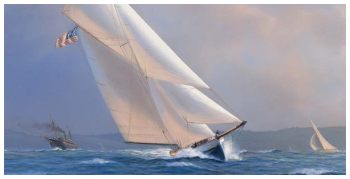 THE AMERICAS CUP WILL STAY HERE.
THE AMERICAS CUP WILL STAY HERE.